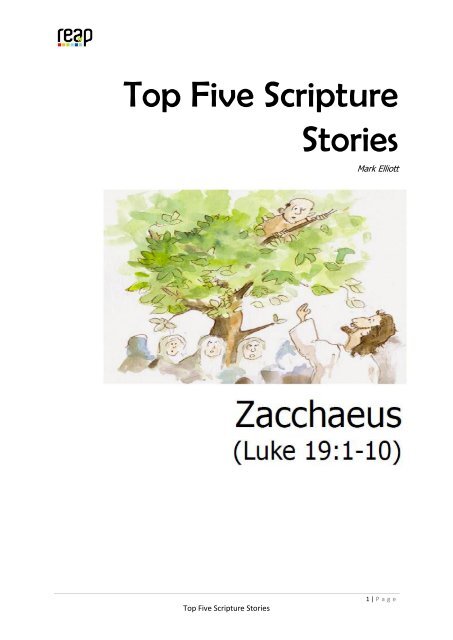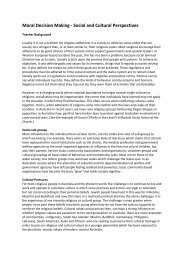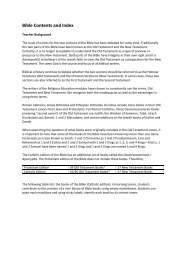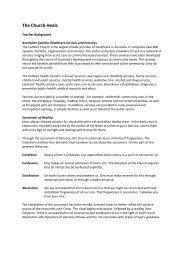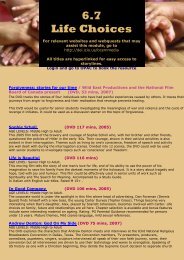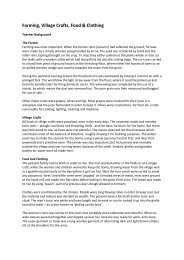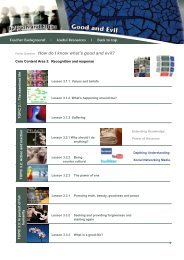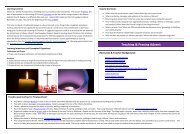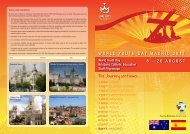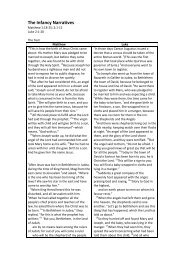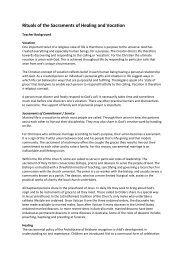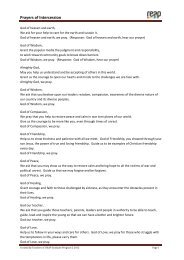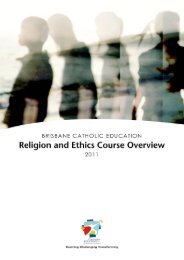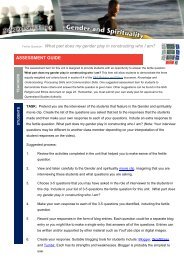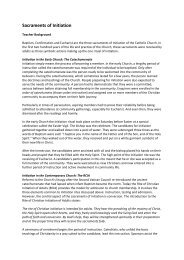CU4 Zacchaeus
CU4 Zacchaeus
CU4 Zacchaeus
You also want an ePaper? Increase the reach of your titles
YUMPU automatically turns print PDFs into web optimized ePapers that Google loves.
Top Five Scripture<br />
Top Five Scripture Stories<br />
Stories<br />
Mark Elliott<br />
1 | P a g e
The Text<br />
1 Jesus entered Jericho and was passing through. 2 A man was there by the name of<br />
<strong>Zacchaeus</strong>; he was a chief tax collector and was wealthy. 3 He wanted to see who Jesus was,<br />
but being a short man he could not, because of the crowd. 4 So he ran ahead and climbed a<br />
sycamore fig tree to see him, since Jesus was coming that way.<br />
5 When Jesus reached the spot, he looked up and said to him, “<strong>Zacchaeus</strong>, come down<br />
immediately. I must stay at your house today.” 6 So he came down at once and welcomed<br />
him gladly.<br />
7 All the people saw this and began to mutter, “He has gone to be the guest of a „sinner.‟ ”<br />
8 But <strong>Zacchaeus</strong> stood up and said to the Lord, “Look, Lord! Here and now I give half of my<br />
possessions to the poor, and if I have cheated anybody out of anything, I will pay back four<br />
times the amount.”<br />
9 Jesus said to him, “Today salvation has come to this house, because this man, too, is a son<br />
of Abraham. 10For the Son of Man came to seek and to save what was lost.”<br />
The Context<br />
Luke’s Gospel<br />
This narrative, found in Luke 19:1-10, is the final story in a long account of Jesus‟ journey to<br />
Jerusalem. The story of <strong>Zacchaeus</strong>, the rich man, comes immediately after one concerning a<br />
beggar.<br />
Luke‟s gospel is dated about 75-85 CE so it is later than Mark‟s.<br />
Although Luke makes use of a great deal of Mark‟s material in his gospel, this<br />
narrative is only found in Luke‟s gospel.<br />
Luke presents Jesus‟ message as having a universal note: it was for everyone,<br />
including those marginalized by society like women, the poor and Gentiles and those<br />
sinners despised by the religious leaders, like tax-collectors. These „sinners‟ did not<br />
observe the detail of the Jewish Law, and therefore were believed to be condemned<br />
by God and so ritually unclean and condemned as outcasts.<br />
Luke also includes narratives where Jesus speaks harshly about wealth and<br />
possessions, in contrast to his emphasis on the importance of the poor and their<br />
nearness to God.<br />
Tax Collectors<br />
A Jew who collected taxes for the Roman authorities was considered both a traitor and<br />
ritually unclean before God. So he was a sinner. Taxes were collected on goods and produce<br />
entering or leaving a town. As chief tax collector, <strong>Zacchaeus</strong> might be head of a group of tax<br />
collectors responsible for custom dues in the area, from goods passing from Perea into<br />
Judaea. This was called tax farming.<br />
Top Five Scripture Stories<br />
2 | P a g e
It was the custom to buy the right to collect tax for Rome from Palestine – a sort of<br />
franchise operation. You recovered your money, plus extra in taxes. Corruption and<br />
extortion were common and hence tax collectors were not popular. Jesus‟ action in inviting<br />
himself to stay with <strong>Zacchaeus</strong> is contrary to what would have been expected of him as a<br />
religious teacher.<br />
Theological Issues<br />
Kingdom<br />
By the time Luke wrote his gospel Christianity had spread through the Roman Empire,<br />
embracing Gentiles as well as Jews. Luke sets the scene for this by emphasising the<br />
universality of the gospel which Jesus proclaimed, which included tax collectors, sinners,<br />
women, foreigners and other „outsiders‟. The Gospel proclaimed the message that everyone<br />
was eligible for citizenship in God‟s Kingdom. Nothing from God‟s point of view would bar a<br />
person from entry, providing that person responded to the invitation, recognising their need<br />
of God. People, who were so self-righteous that they did not see their need of God could cut<br />
themselves off by their blindness, but God‟s offer remained open to everyone. The basis of<br />
this offer was that everyone was God‟s creation and everyone mattered to God because<br />
everyone was part of God‟s plan and needed to be „on board‟.<br />
Wealth<br />
Jesus‟ teaching about wealth gives pointers rather than a clear code of practice. Wealth<br />
comes with dangers, the chief being that it can become like a god, demanding allegiance<br />
and becoming the main focus of a person‟s life. Jesus said that it was necessary to choose<br />
between serving God or money. Money makes it harder for a person to get their priorities<br />
right and God often takes second place to money. In this encounter, <strong>Zacchaeus</strong> contrasts<br />
with the rich man Luke 18:18-23 whom Jesus told to sell everything and give to the poor.<br />
Wealth in spiritual matters as opposed to material wealth is a thread running through the<br />
Bible. Spiritual wealth is eternal whereas material wealth is part of this material existence.<br />
Sinners<br />
'I have come not to call the righteous but sinners to repentance' means: For outcasts like<br />
<strong>Zacchaeus</strong>, there is the affirmation of the right to belong to the people of God after<br />
repentance. For communities inclined to exclude, there is the challenging reminder of Jesus'<br />
mission and example. For the wealthy, it is the model of what conversion should mean.<br />
Jesus was interested in those in need of God who were ready to change their ways to<br />
restore their relationship with God.<br />
Repentance<br />
<strong>Zacchaeus</strong> had everything to keep him from repentance - his wealth, the „hardness of his<br />
heart‟ induced by his unpopularity, his high position. His was a very practical form of<br />
repentance, which prepared him to return to God. In response to Jesus‟ acceptance of him<br />
and willingness to eat with him, he realised his need to repent in order to wipe his slate<br />
clean before God. This repentance was shown in practical terms, which enabled him to have<br />
a new start with God.<br />
Top Five Scripture Stories<br />
3 | P a g e
Discipleship<br />
The meaning of discipleship is expressed in <strong>Zacchaeus</strong>‟ joyful and immediate response. He<br />
took his opportunity, not holding back anything in order to make amends and demonstrate<br />
his repentance and determination to lead a new life. His was complete commitment, shown<br />
through drastic changes to his life-style.<br />
Table Hospitality<br />
Here is a very practical example of how Jesus made contact with those considered „sinners.‟<br />
He took the initiative and invited himself to the sinner‟s house. He broke through social<br />
convention to ensure he made personal contact with the outcast. He made <strong>Zacchaeus</strong> feel<br />
that he mattered and presumably shared a meal with him.<br />
Interesting Facts<br />
<strong>Zacchaeus</strong> name means Pure One.<br />
Jesus sets out from Jericho [City of Palms] to Jerusalem about 24km, approximately<br />
4-8 hours all up hill.<br />
Jericho is 230 meters below sea level and Jerusalem 795 metres above. A total climb<br />
of 565 metres. The custom was that you started early morning with rest in the<br />
middle of day.<br />
<strong>Zacchaeus</strong> Online<br />
http://clipart.christiansunite.com/Pictures_of_Jesus_Clipart/<strong>Zacchaeus</strong>_Clipart/<br />
(Clipart images of the <strong>Zacchaeus</strong> story)<br />
www.sermons4kids.com/zacchaeus-ppt-slides.htm<br />
(Nine PowerPoint Slide Masters of the <strong>Zacchaeus</strong> story)<br />
www.bible-history.com/taxcollectors/index.html<br />
(Tax Collectors section of the Bible History Online website)<br />
http://clipart.crossmap.com/search_images/<strong>Zacchaeus</strong>.htm<br />
(Clipart of <strong>Zacchaeus</strong> for younger students)<br />
http://www.crossroadsinitiative.com/library_article/280/<strong>Zacchaeus</strong>___Look_Who_s_Coming_t<br />
o_Dinner.html<br />
(A very readable commentary on the <strong>Zacchaeus</strong> story)<br />
www.whosoever.org/v9i3/yeshua.shtml<br />
(Another very readable commentary on the <strong>Zacchaeus</strong> story)<br />
www.allojunior.org/english/newz_bd_zacchaeus_01.htm<br />
(Cartoon story about the <strong>Zacchaeus</strong> for kids)<br />
Top Five Scripture Stories<br />
4 | P a g e
Scripture Connections<br />
<strong>Zacchaeus</strong> Four Resources Questions<br />
Kingdom<br />
This narrative emphasises two types of community: the local community in which <strong>Zacchaeus</strong><br />
lived and the community of God; the kingdom. <strong>Zacchaeus</strong>‟ behaviour had cut him off from<br />
his fellow citizens. It was selfish and anti-social and he was not popular. But once he was<br />
faced with his real self, in the presence of the love and acceptance of Jesus, he was willing<br />
and able to change.<br />
Why did Jesus‟ method work with <strong>Zacchaeus</strong>?<br />
Is it possible to have „sinners‟ in a society that does not believe in God?<br />
Why do some people find it so hard to accept those whose lifestyle is so different<br />
from other people‟s and whose standards fall „below‟ what society expects?<br />
What reactions are aroused in society by other people‟s „sinfulness‟ (satisfaction,<br />
superiority, shame, condemnation etc.)? What do you think are the roots of these<br />
reactions?<br />
What divides our world? Do people care that it is divided?<br />
As well as looking for similarities between people, faiths, and societies, what happens<br />
when difference is not recognised? What are the proper ways of respecting<br />
difference without causing division?<br />
Top Five Scripture Stories<br />
5 | P a g e
Wealth<br />
Modern society, like most societies before it, is immersed in the pursuit of wealth and all the<br />
dangers that that brings with it. People are encouraged to buy more through advertising and<br />
status is given to those who have money. Students need to reflect on the place of money in<br />
life, to increase their awareness of its power and gain a critical approach towards<br />
consumerism and materialism. They should be able to contrast wealth in money terms with<br />
the riches that can be acquired in other ways.<br />
What encourages the belief that money is the key goal in life?<br />
What power can money buy? What temptations does it present?<br />
What dangers are inherent in trusting money?<br />
Why is it said that the problem with money is not money itself but the love of<br />
money?<br />
What measures can be taken to keep money in perspective?<br />
Why is the love of God not compatible with the love of money?<br />
Sinners<br />
<strong>Zacchaeus</strong> lost his place in society because of his behaviour. People grumbled about Jesus<br />
for taking notice of such a person. People still today are dismissive of those whose<br />
behaviour doesn‟t meet certain expected standards. There is a great desire to see the sinner<br />
pay the price for the wrongdoing. Reactions can even engender violence and protests. The<br />
media has a field day when this happens. However, throughout the gospels Jesus<br />
emphasises that God‟s way is different and that hating the sin is not the same as hating the<br />
sinners.<br />
How far does the Church still influence the standards of society and individuals<br />
today?<br />
Who are the people that modern society seems to ostracise?<br />
What encourages the stereotyping of groups of people as „sinners‟?<br />
Why might „self-righteousness‟ be the worst sin? Might self-righteousness be likely to<br />
increase in a society that rejects God?<br />
Is punishment or reform more important for the prisoner?<br />
In what ways are students ostracised in school? How guilty are schools of labelling<br />
students? Do schools provide enough chances and opportunities for students to<br />
change their behaviour?<br />
Cheating<br />
<strong>Zacchaeus</strong>‟ sin was cheating people, taking more money in taxes than he should have done.<br />
Cheating appears in many guises and situations and must be one of the commonest forms<br />
of social sin. It shows a lack of concern for the feelings and rights of other people. People<br />
cheat in relationships, sports, business, examinations, homework, false declarations.<br />
Students encounter cheating from an early age, whether it is in a game that they are<br />
playing or in a bag of sweets that someone fails to share out fairly.<br />
Top Five Scripture Stories<br />
6 | P a g e
It‟s tied up with justice and fairness, all of which are part of their lives. It is important that<br />
this aspect of life should be exposed to discussion and students allowed to reflect on its<br />
implications for their lives and society in general.<br />
Why is cheating such a common feature in everyday life?<br />
What feelings result from cheating someone and from being cheated?<br />
Why does cheating spoil personal relationships?<br />
In what ways might people cheat themselves?<br />
Can cheating be prevented? If so, how?<br />
Can people cheat on God? In what ways?<br />
How did Jesus make it easy for <strong>Zacchaeus</strong> to own up to his cheating?<br />
Role models<br />
Perhaps <strong>Zacchaeus</strong> was in search of something when he hid up the tree to catch a glimpse<br />
of Jesus. Although he had plenty of money, there was a lot missing from his life. When he<br />
met Jesus, he took no time at all in recognising that his real need was not money but a new<br />
way of being. Selfishness had been his guiding principle. Now Jesus replaced that. Jesus can<br />
be presented as someone whom people over 2000 years have admired enough to follow as<br />
an example of how life can be lived. Jesus‟ followers illustrate the human need for<br />
inspiration from someone who can be admired because of the way they lived their life.<br />
Why do people need to follow others? Is it a sign of weakness or courage?<br />
Why has Jesus had such a large following? What aspects of Jesus‟ life might appeal<br />
to people?<br />
How important is it for young pupils to be inspired by the lives of special people?<br />
What concerns might be raised about the type of role-model the media offers young<br />
people?<br />
Top Five Scripture Stories<br />
7 | P a g e


